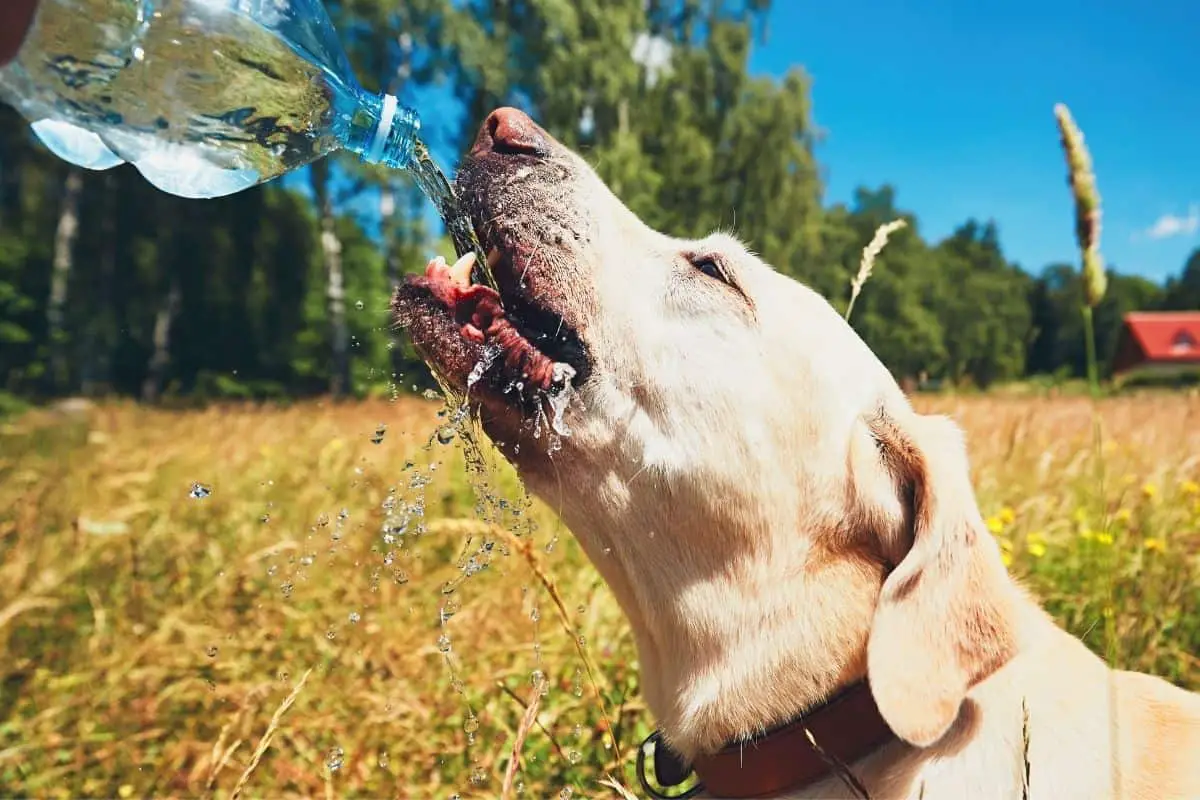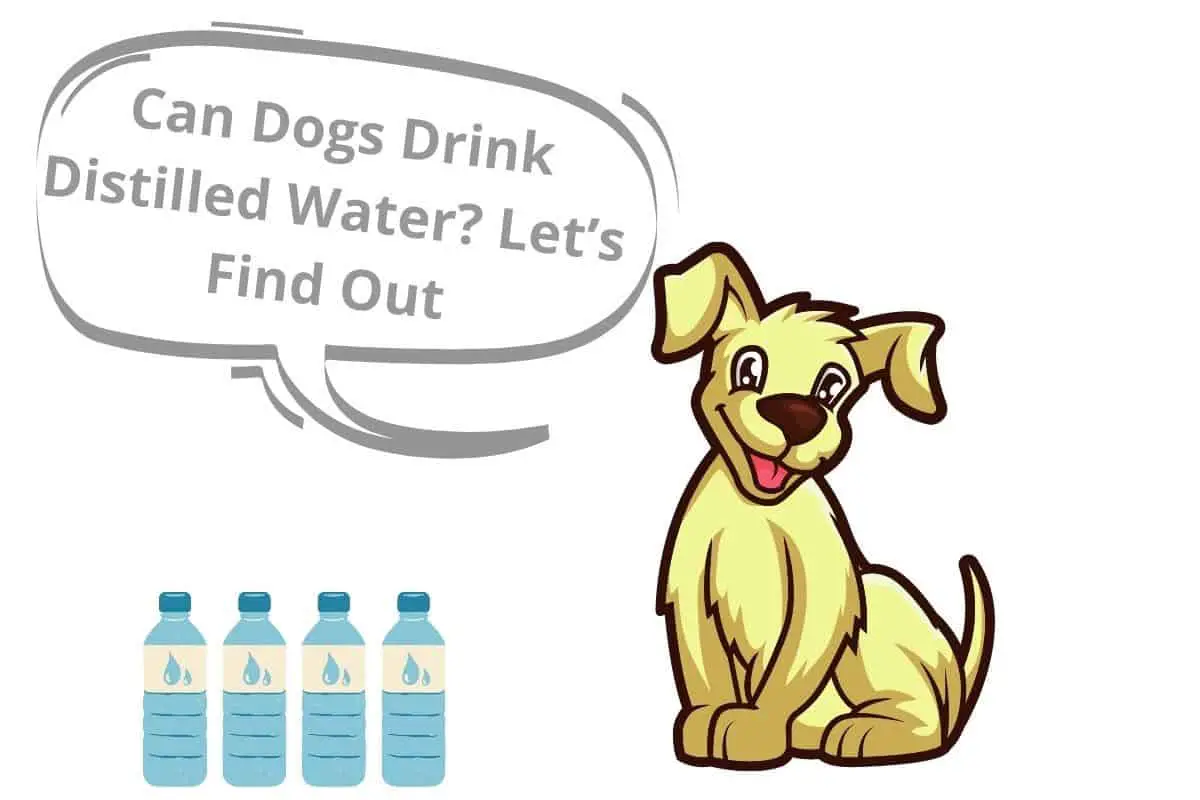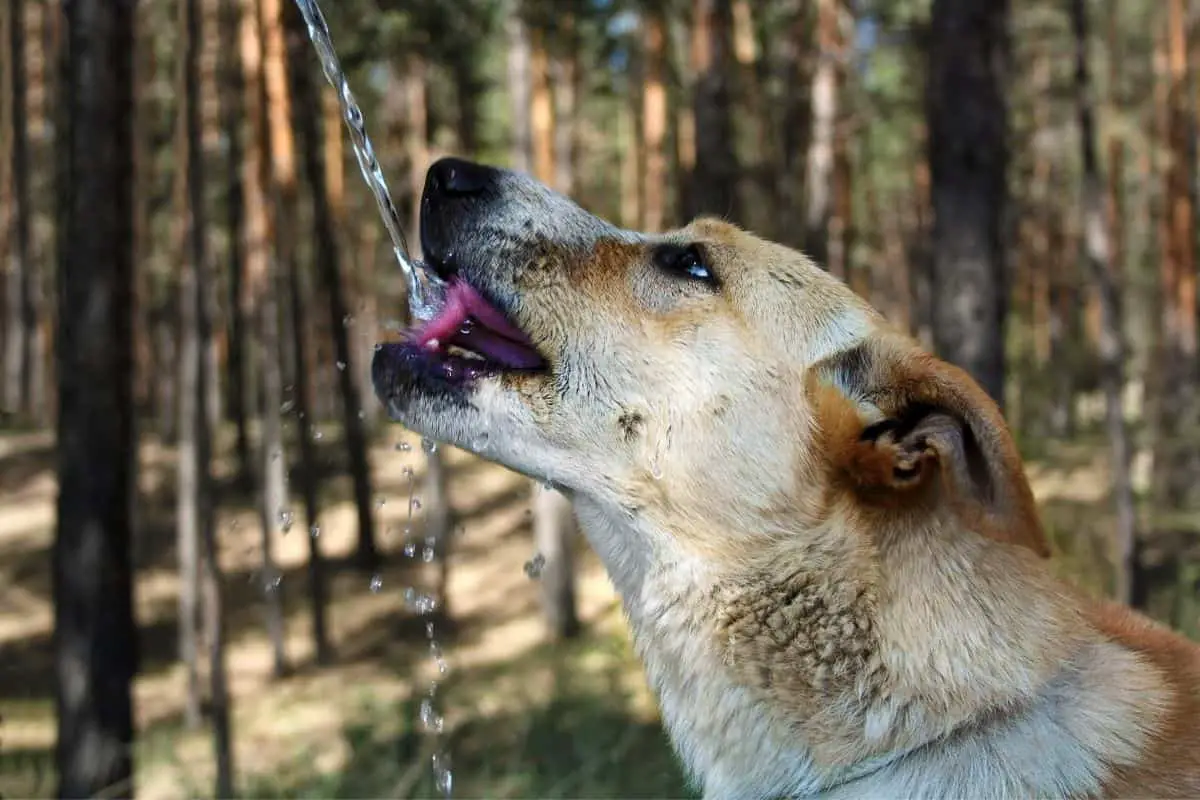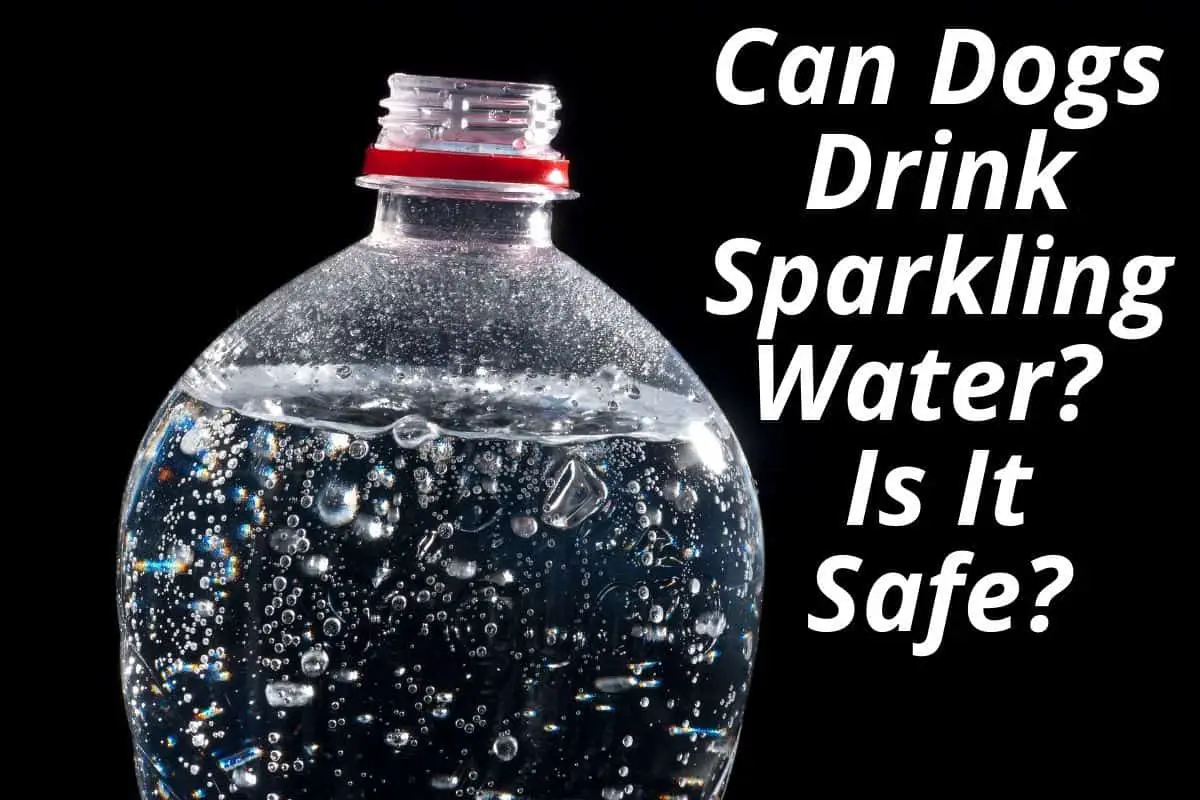This post contains affiliate links.
Most dog owners know that if their dogs had free reign, they would put anything and everything they found into their mouths. They also know that many things a dog willingly ingests isn’t always good for them. So are there any beverages a dog should be drinking other than water?
Dogs can drink small amounts of fruit juice or broth besides water, but they shouldn’t drink them regularly. Most beverages that humans enjoy have at least one harmful component for dogs. Even a small amount of caffeine, sugar, citric acid, alcohol, or lactose can make your dog sick.
In general, water is the best way to keep your dog hydrated, especially during the warmer months. Other drinks usually won’t provide any nutritional value, plus, some can actually harm your furry friend. This guide will help you learn which drinks will require you to call your vet and which ones your dog can stomach without medical intervention.
Table of Contents
Will Your Dog Drink Anything Besides Water?
Most dogs are inquisitive and like to explore the world around them with all of their senses. This means they’ll very likely drink any liquid they have easy access to, whether it’s good for them or not.
However, dogs should be primarily drinking water. Good hydration is important for their bodies to function well.
Though not all water is created equal. The best thing for your dog to drink is clean drinking water. While your dog might happily lap up the water they find in the toilet bowl, or outside in a mud puddle, decorative fountains, and swimming pools, there’s a risk of these water sources carrying bacteria, parasites, or diseases, not to mention chemicals.
You should try to keep your dog from drinking any water they find, but there are riskier beverages out there.
Drinks Your Dog Should Never Have
You may have several beverages in your home that your dog expresses an interest in. However, just because your dog wants it doesn’t mean it’ll be healthy for your dog. Caffeine, alcohol, lactose, sugar, and citric acid will all upset your dog’s body one way or another.
Dogs don’t have the same digestive system as humans do, so drinks that seem harmless or even healthy for us can make a dog very sick or at least uncomfortable. Drinks like alcohol or soda, which have known health risks for humans, are extra dangerous for dogs. Don’t leave these beverages unattended where your dog can reach them, and never give them to your dog on purpose.
Caffeine
Coffee, tea, energy drinks, and caffeinated sodas can be really dangerous for your pet. Caffeine has similar effects on a dog’s body as a human’s, including elevated heart rate. However, dogs are generally much smaller than humans, and it takes a lot less caffeine to give a dog caffeine toxicity, also known as caffeine poisoning.
The most dangerous part of caffeine for your dog is the way it affects their heart rate. Too much caffeine can cause irregular heartbeats or even a heart attack or seizures. Even a little bit of caffeine can be bad for your pet, so if they ingest any, you should contact a vet right away.
Depending on how much caffeine a dog consumes and how big they are, the vet might induce vomiting or try IV fluids to try to get as much caffeine as possible out of your dog’s system. They can also treat your pup for heart palpitations and make sure they stay safe until the caffeine is out.
Alcohol
Similar to caffeine, any amount of alcohol is bad news for dogs. There are a wide array of bad reactions a dog can have to alcohol, ranging from diarrhea and mild coordination issues to falling into a coma or even dying.
The exact impact on your pet depends on what type of alcohol it is and how much your dog drinks compared to the dog’s body mass. If the alcohol has other ingredients that are bad for them, the effects could be more serious.
For example, grapes are highly toxic to dogs so if your dog drinks wine, it isn’t just the alcohol content that could be a problem. As soon as you think your dog has ingested alcohol, you should contact your vet or an animal poison control center near you.
You shouldn’t try to induce vomiting from your dog on your own. If done incorrectly, your dog could accidentally choke on their own vomit. The best thing to do is to stay calm and get your furry friend to a professional as soon as possible for evaluation and treatment.
Milk
Dogs shouldn’t drink milk because of the lactose content. Dogs can only drink their mother’s milk as puppies, and that milk is very different from cow’s milk. Cow’s milk isn’t as dangerous for a dog as caffeine or alcohol, but it’ll upset their stomach.
Too much milk will cause diarrhea and possibly vomiting for your dog. It’s not likely that you’ll need to take your dog to the vet for this unless the diarrhea doesn’t stop or your dog becomes lethargic and can’t keep any other food down.
Some dogs might be able to have a little milk with no problems, but you shouldn’t give them milk or offer it as their primary beverage. They don’t need any nutrients from milk as adults, and puppies should only be drinking their mother’s milk or a specific puppy formula, not cow’s milk.
Soda & Lemonade
Aside from the caffeine dangers, soda has a sugar content that is way too high for dogs. It takes a lot less sugar to increase a dog’s blood sugar level than it does to increase a human’s. Giving your dog too much sugar can lead to long-term health consequences like diabetes.
Lemonade doesn’t have the caffeine problem that soda does, but it does have too much sugar. The lemon is also too acidic for a dog to digest comfortably. Too much citric acid will give your dog an upset stomach which can lead to vomiting and diarrhea.
While a few sips won’t give you anything other than an unpleasant afternoon, consistently letting your dog drink lemonade could damage the lining of their stomach, leading to ulcers and other larger health problems. As with the other beverages on this list, if your dog drinks some accidentally, you should contact a vet as soon as you can.
Drinks Your Dog Can Have Occasionally
Many human drinks are dangerous for dogs, but there are a few your dog can have in moderation as an occasional treat. Still, you need to look very carefully at the ingredients of anything you give your dog because added chemicals or preservatives will turn harmless-looking juice into a massive stomach ache.
Fruit Juice
Dogs can handle some fruit juice, but you should only give them fresh juice. Bottled fruit juices or juices from concentrate almost always have added chemicals, flavorings, sugar, and preservatives, all of which are bad for your dog.
Additionally, not every fruit is safe for dogs. Grapes are known to cause kidney damage and even failure in dogs, so grape juice is much more dangerous for your dog than apple juice. Citrus juices can also irritate your dog’s stomach lining, so orange juice and grape juice are also bad ideas.
Really, the best way for dogs to consume fruit juice is if you give them a piece of seedless fruit. The natural sugars in fruit are much lower than the sugar content of a soda or grocery store fruit juice, so they’re safer for your dog. However, juice won’t provide dogs with any necessary nutritional value.
Gravy & Broth
Gravy and broth might seem like safe options for your dog, given they’re often included in the wet dog food you might feed your pup. However, this is another case where you need to read the ingredients carefully. Not everything that a human can process will agree with your dog.
For gravy, any added milk or dairy (like butter) can cause diarrhea. Added flour or other thickeners might make your dog gassy, too. Salt is another ingredient that can be especially dangerous for dogs. As with sugar, it doesn’t take much salt to throw your dog’s bloodstream out of whack, which can lead to sodium ion poisoning.
Salt also dehydrates your dog, which will make them thirstier, which could lead to them drinking more gravy and increasing the problem. If you’re feeding your dog any sort of broth, you should only give them sodium-free broth for this reason.
Meat-based broths can be a good way to slowly increase the liquid in your dog’s diet or help a dog with a sore mouth get some nutrients without too much chewing. However, the broth shouldn’t be your dog’s primary source of hydration, and you should only give it to your dog with your vet’s guidance.
Why Water Is the Best Drink for Your Dog
Ultimately, nothing but water is going to hydrate your dog the right way. Dogs need water just as much as human beings do to keep their bodies working properly. They need it for virtually every system in their bodies, from their joints to their blood.
Dogs also lose a lot of water in the summer and extreme heat. They can’t sweat the way people do, so they pant to cool off. Panting uses up a lot of water, so they need extra fluids during the summer. Beverages other than water might temporarily satisfy a dog’s thirst, but they won’t effectively hydrate your pet.
It’s important to make sure your dog always has access to plenty of clean drinking water. If your dog seems reluctant to drink from his bowl, you might want to try a different shape or even a fountain. The moving water in a drinking fountain might hold your dog’s interest enough to get them hydrated.
The PetSafe Drinkwell Multi-Tier Drinking Fountain from Amazon.com is an affordable option to consider. The upper tier is tall enough for most medium to large dog breeds, and the lower tier provides access for smaller breeds. It holds up to 100 ounces (2,957.35 mL) of water at a time, and it filters the water as it moves through the fountain so that it’s always fresh.
During the warmer months, it’s also a good idea to carry a collapsible dog bowl and a water bottle for your dog when you go on walks. If your dog gets thirsty while you’re out and you don’t have a source of clean water for them, they might try to drink from puddles or other potentially unsafe water sources. Any time you would take water for yourself, make sure you have some for your pup as well.
Conclusion
Your dog’s primary source of hydration should always be drinking water. Most other beverages will, at the very least, upset your dog’s stomach because a dog’s body isn’t meant to digest them. While some other liquids like fresh fruit juice or gravy can be a nice occasional treat, human beverages should be off-limits to dogs.
Some drinks will just give your dog diarrhea, but others can be fatal, so it’s best to stick to water and contact your vet if your dog gets into something they’re not supposed to drink.
Related Articles
- Can Dogs Drink Sparkling Water? (Is It Safe?)
- My Dog Drank Pool Water: Here’s What To Do About It
- Dog Water at Night – When To Cut Them Off
- Considering Forcing a Dog To Drink Water? (Read This First)
- Can a Dog Go 8 Hours Without Water?
- Can Dogs Drink Coconut Water? Let’s Find Out!
- Can Dogs Drink Distilled Water? Let’s Find Out
- How Long Can Dogs Go Without Water? (We Ask the Experts)
Sources
- Pet MD: Caffeine and Pets: Safety Tips and Considerations
- Vet Info: What Can Dogs Drink Besides Water
- Canine Journal: What Can Dogs Drink?
- ASPCA: People Foods to Avoid Feeding Your Pets
- Dogster: What Type of Water Alternatives Can Dogs Have?
- Fetch by WebMD: Foods Your Dog Should Never Eat
- American Kennel Club: What to Do If Your Dog Drinks Alcohol
Mrdogfood.com is a participant in the Amazon Services LLC Associates Program, an affiliate advertising program designed to provide a means for sites to earn advertising fees by advertising and linking to Amazon.com. We also participate in other affiliate programs which compensate us for referring traffic.






